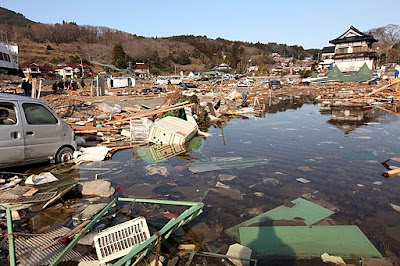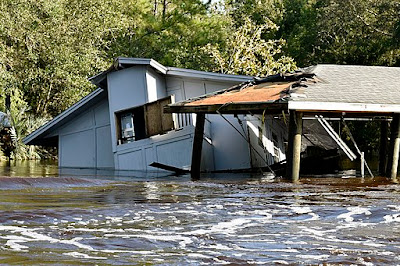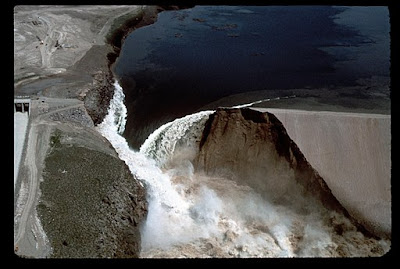Earthquake Hazards: Flooding
Like many of the other earthquake hazards, a lot of people don't associate flooding to an earthquake...until they really think about it.
When earthquake hazards are discussed, it's not just the obvious shaking of the ground, it's what the shaking of the ground can potentially cause. I'm not sure if the actual shaking of the earth even kills anyone. It's the effects caused by the earthquake that are the hazards.
For example, buildings collapsing are caused by the earth shaking.
Similarly, if you have water near your home, you could experience earthquake-induced flooding.
Earthquake-induced tsunamis, seiches, and dam failures can all lead to flooding.
 |
| Debris in flooded street at Uranohama Port, Japan, on 1 April 2011, in aftermath of earthquake and subsequent tsunami. |
Thankfully I live far enough from any large body of water that I'm not concerned with a earthquake-caused Tsunami, like the 2011 Tohoku, Japan earthquake that shook at magnitude 9.1 and caused a tsunami that was nearly 130 feet high and impacted about 1,242 miles of coastline. It's estimated that particular tsunami probably killed about 15,899 people with another 2,527 missing and 6,157 injuries (On This Day: 2011 Tohoku Earthquake and Tsunami).
Smaller bodies of water, can also produce waves called seiches that can inundate coastal areas.
For me, I live near a river (within about 200 feet of it) and if one or both dams upstream break, the flooding will definitely affect where I live. Personally I'm not too concerned about the dam structures themselves as they're supposed rated to a high magnitude 7 rating. But, I'm not sure about how well the abutments will hold up to extensive shaking. I suspect the weak points will be in those areas, where the dam meets the canyon walls.
 |
| Flooding after Hurricane Irma, 13 September 2017. US Fish & Wildlife Service photo |
Earthquakes can damage dikes and levees along rivers and waterways, which can then flood nearby areas. Often the areas along rivers and natural waterways are the natural flood plains, but our modern civilization has contained the water flow.
The threat of flooding, particularly from damaged dikes and levees, is a big concern for those in the risk area for a large New Madrid earthquake. I discuss this in chapter 10 of my book, and will post information from that scenario in a future post.
 |
| Road closed after Minnesota river flooding on Sep 29, 2010 |
And for those who think they don't have to worry about earthquake-induced flooding because they live far away from any body of water, here are three examples of flooding that could affect you.
 |
| Teton Dam flood, 5 June 1976. ID-L-0010, WaterArchives.org |
Second, if a water main breaks near your home you could experience flooding.
Finally, and this is applicable to anyone with a home that has water running into it, and the vast majority of homes do, there are some potential flooding threats inside your home. If a water pipe breaks/bursts it could result in flooding. If you have a water heater and it tips, you will very likely have flooding in your home. If you live in an apartment, condo, townhome, or other residence that is next to a neighbor, then flooding in that residence could come into yours.
In any case, it's good to know how to shut off your water main. Here's my post about that.

Comments
Post a Comment